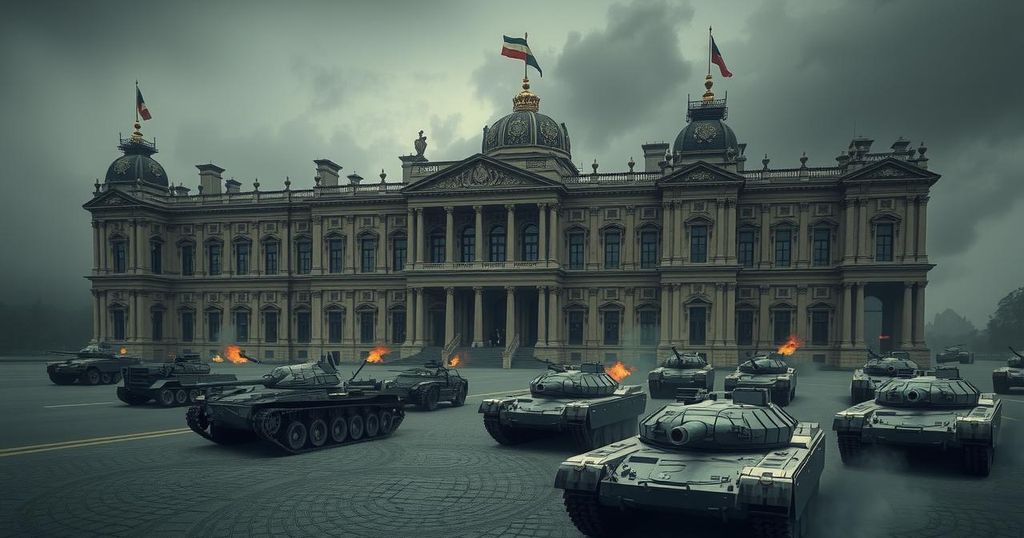Sudan’s Military Regains Control of Republican Palace Amid Ongoing Conflict

Sudan’s military has retaken the Republican Palace in Khartoum from rival paramilitary forces after nearly two years of conflict. This marks another gain for military leader Gen Abdel-Fattah Burhan. The situation remains precarious, with ongoing violence and a humanitarian crisis affecting millions. The palace has symbolic historical significance in Sudan’s governance.
Sudan’s military has officially regained control of the Republican Palace in Khartoum, marking a significant development in the ongoing conflict against rival paramilitary forces. This palace, which had been a stronghold for these forces, saw soldiers celebrating their achievement by proclaiming the 21st day of Ramadan. The palace appears damaged, with footage showing military personnel inside chanting, “God is the greatest!” as they navigated through the debris.
Khaled al-Aiser, the information minister of Sudan, announced the retaking of the palace via social media, stating, “Today the flag is raised, the palace is back and the journey continues until victory is complete.” The palace, located along the Nile River, had historically served as the government seat and signifies another victory for the Sudanese military under General Abdel-Fattah Burhan. Recent months have seen the military successfully pushing back the Rapid Support Forces (RSF) led by General Mohammed Hamdan Dagalo from the capital region.
While sporadic gunfire was reported throughout Khartoum, it remains uncertain whether these sounds resulted from ongoing combat or were celebratory. The RSF has yet to address their loss of the palace, which is expected to be just one phase of the conflict, as they maintain positions elsewhere in Sudan. Recent reports indicated that the RSF claimed control of al-Maliha, a desert city strategical for both local logistics and regional access, although the Sudanese military has not confirmed this loss.
The ongoing conflict has led to widespread humanitarian crisis, with estimates indicating over 28,000 fatalities and millions displaced. The UN children’s agency has remarked on the dire conditions, which have pushed some families into desperate situations where they are resorting to foraging for food. Furthermore, the Republican Palace has a historical significance, serving during British colonization and as a symbolic site for Sudan’s independence in 1956.
Political instability in Sudan intensified when a military coup disrupted a transition to democracy initiated after the ousting of former President Omar al-Bashir in 2019. The conflict escalated in 2023 when Burhan and Dagalo’s forces began their dispute, leading to serious civilian casualties and persistent allegations of human rights violations against both factions involved in the fighting.
In summary, the Sudanese military’s recapture of the Republican Palace signifies a pivotal moment in the ongoing conflict with the RSF. While this act represents a strategic victory, the humanitarian crisis continues to deepen with high casualty rates and significant displacement. The historical implications of the palace underscore the broader struggle for power and governance in Sudan, amidst a backdrop of severe humanitarian concerns and allegations of genocide. The conflict presents significant challenges and raises urgent calls for a resolution to protect the civilian population.
Original Source: www.irishnews.com








